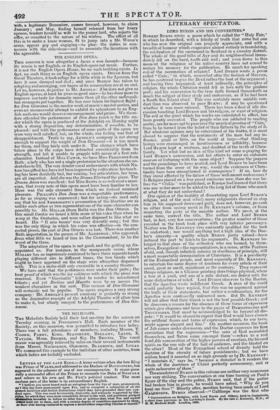THE ENGLISH OPERA.
THIS concern is now altogether a tutus a non lucendo—because its music is not English, or its English opera not music. Further, it is not the English Opera House, for no such building exists. In fact, no such thing as an English opera exists. Driven from the Great Theatres, it took refuge for a little while in the Lyceum, but here it soon drooped and died ; and since BISHOP has taken to adapting and arranging, our hopes of its resurrection are at an end. Let us, however, do justice to Mr. ARNOLD : if he does not give us English operas, at least he gives us good ones—he has done more to improve our taste for dramatic music than all the other metropoli- tan managers put together. He has now taken his highest flight ; for Don Giovanni is the master work of music's master genius, and even an unsuccessful attempt to exhibit its splendours to an Eng- lish audience would deserve encouragement and praise. We there- fore attended the performance of Don Juan (such is the title un- der which the opera is produced at the Adelphi) on Monday night with a strong disposition, nay determination, if possible, to be pleased : and with the performance of some parts of the opera we were Very well satisfied, but, on the whole, our feeling was that of disappointment. Truth to say, ARNOLD'S company is not strong enough to support the weight of Don Giovanni—it is too much for them, and they fairly sink under it. The changes which have 'taken place in the corps have detracted considerably from its strength, and left it unable to grapple with music of a first-rate character. Instead of Miss CAwSE, we have Miss FERGUSON from Bath ; a lady who has not a single pretension to the situation she un- dertakes to fill. The very slender vocal endowments with which Na- ture has gifted her, have not been improved by cultivation : herteach - ing has been decidedly bad, her voicing, her articulation, her tune, are all imperfect. And she was the Donna Etvira of the piece. The Donna Anna was excellent; but Miss BETTS is so well-read a musi- cian, that every note of this opera must have been familiar to her. Hers was the only character from which we derived unmixed pleasure. PHILLIPS'S Don Juan was a respectable performance, as far as singing was concerned ; but for .acting—we need only -say that his and AMBROGETTI'S personation of the libertine are as unlike each other as two representations of the same character can possibly be. Mr. MiLe.aa. (from Bath) was the Don Ottavio. In this small theatre we heard a little more of his voice than when he sung at the Oratorios, and were rather disposed to like what we heard. His " 11 mio tesoro" was very decently sung ; but this was the only thing in which his voice was effective—in the con- certed pieces, the part of Don Ottavio was lost. There was another Bath importation, in the person of Mr. ALDRIDGE ; who appeared, from what little we heard of him in the Conzmandant, to be the worst of the three. The adaptation of the opera is not good, and the getting up dis- appointed us. For instance, in the masquerade scene, where MOZART has so ingeniously contrived to have three separate bands playing different airs in different times, the two bands which ought to have appeared on the stage were altogether dispensed with. This is a make-shift only excusable in a country theatre. We have said that the performers were under their parts; the best proof of which was the icy coldness with which the piece was received. Even " Giovinette " failed to receive its accustomed tribute ; and yet Zerlina and Masetto were by no means the weakest characters in the cast. This version of Don Giovanni will certainly not be popular. The opera requires a very strong company: Mr. ARNOLD'S present company is probably as strong as the diminutiVe receipts of the Adelphi Theatre will allow him to make it, but utterly unequal to the performance of Don Gio- vanni.


























 Previous page
Previous page